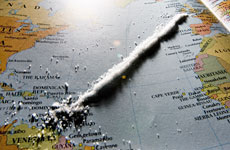There are places in this world where governments and time forgot. The Bluefields in Nicaragua sits at a geographical point which, until recently, was a forgotten world that has very little electricity and a self-polices the residents of fishing villages where boats create the largest commerce.
 Until the cocaine starting washing up onto the beaches and the fishing netted more than just the exotic wildlife that sits on the tip of the Carribean community.
Until the cocaine starting washing up onto the beaches and the fishing netted more than just the exotic wildlife that sits on the tip of the Carribean community.
Bluefields is located halfway between the cocaine labs of Colombia and the 300 million noses of the United States, Bluefields is ground zero for cocaine transportation. The stretch of water is where what the U.S. Government calls “go fast boats” speed through a small strip of water avoiding international drug agencies. Much of the cargo is dumped at sea and the tide brings what the locals call “white lobster” onto Bluefields beaches. And it’s created a world where the residents realize they don’t have to work and have used the drugs to build large luxury homes next to fishing shacks.
The village has a new hobby. With very little retail commerce available in Bluefields, residents comb the beaches finding the “white lobster” and turning it into fast money. As the village gives back to the community with what they fish, the same goes with the money made from the cocaine and the sale of the cocaine has helped build schools and businesses as the fisherman pay for local infrastructure as no money for these things come from the Nicaraguan government. Bluefields has little government and things are decided by committee and ironically the influx of the the drug has created little violence although researchers cite they do spend a lot of money on beer.
The community, now known as Little Miami, sits silently waiting for the next gift from the sea. Except this time, the bounty is man-made.
And Bluefields benefits.







